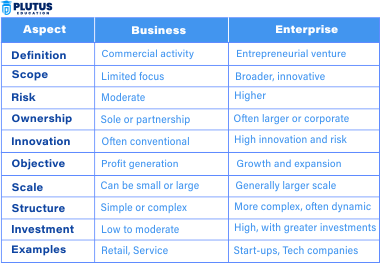Business and enterprise differ according to scope, purpose, and structure. Business refers to an organised body of people who operate in a commercial field to gain profit by selling their goods or services. Enterprise is much more extensive in scope; it refers to any initiative, project, or venture, for profit or not. This makes the distinction between enterprise and business even more evident. Every business is an enterprise, but not every enterprise is a business. An enterprise could just be a startup, a social cause, or even an NGO, whereas a business is the art of making profits. The definition of business vs enterprise differs based on the context being used, although businesses are some legally recognised entities that operate to raise profit in commercial terms. Enterprises can be innovatively designed ventures that may or may not be profit-oriented.
What is Business?
The term business designates an endeavour that manufactures products or services that it sells for financial gain. The monies earned are taken home through the selling or exchange of goods and/or services.
Generally, each business has three central objectives, as outlined below. A company can be owned in various ways, depending on the scale of the industry and legal needs; it may be a sole proprietorship, partnership, corporation, or LLC. Every enterprise is a business, but not every company is an enterprise.
Business Characteristics
Business involves regular production and exchange of goods or services for profit. It requires investment, risk-taking, customer satisfaction, and adherence to legal regulations.
Profit-Orientation
A business should profit from sales of goods or services that benefit customers. A company has to run efficiently in terms of cost management, marketing, and sales so that revenue exceeds expenses. Profit maximisation drives everything in a business, from the pricing strategy to the operational procedures. If a company cannot consistently profit, it will eventually close down or fail. Ensuring profitability is, therefore, central to the daily activities and decisions within a business.
Legal Entity
A business can be defined as an entity under law that adheres to and has to enforce rules and regulations has been known in its various structures to include being a sole proprietor, a partnership, a corporation, and also an LLC, where the selected form of legality may affect taxing treatment, structure governing the organisation and liabilities treatment. Registration with the appropriate authorities is usually necessary, and businesses are also governed by the laws that apply to their activities, including health and safety legislation, employee rights, and tax obligations. Legal recognition in this way can shield the business owner from personal liability in some respects.
Organised Operations
Business activities are carried out in a well-structured and organised manner. This involves all the processes that include production, inventory management, marketing, sales, customer service, and financial management. An organised business provides for smooth daily operations and is expected to attain goals most efficiently.Most companies have created standard operating procedures (SOPs) and invested in management systems that will help them to monitor their performances, control the risks they might face, and control their cost. The operating structure offers this consistency in providing products or services to the customer.
Market-Driven
It depends much on the marketplace conditions for the business to be successful. Companies should adapt to customer preferences, market demand, competition, and other external factors influencing their operations. Market research may be required to understand trends, customer behavior, and emerging needs for companies to compete profitably.
Businesses that are not aligned with the changes in the market tend to fail at attracting and maintaining customers. Thus, without market responsiveness, a company is bound to fail or get relegated to the dustbin.
Risk and Investment
Starting and running a business is a financial investment that carries risk to a certain extent. Entrepreneurs and business owners must invest in infrastructure, stock, employees, marketing, and equipment to start a business. There is always a risk of failure, especially in the early stages, where cash flow may be limited.
Even established businesses face risks such as market downturns, increased competition, or changing consumer preferences. Managing risks through strategic planning, diversification, and financial control is essential for a successful business.
Scalability
Various techniques such as expansion of the market, diversification of products, or franchising can help grow a business further and increase the market share. However, how scalable it becomes depends on the industry, level of competition, and business model. A small business may start with a small local community and scale up in multiple locations or through product offers or digital platforms to reach larger audiences. Growth is usually measured in terms of revenue, customers served, and market penetration. Scaling, however, is very different, requiring meticulous planning and further investment in resources and infrastructure.
Customer-centric
Most businesses are customer-centric in the drive for success. Companies need to create value for their customers in terms of both product or service quality, customer service, or even a value proposition that is uniquely differentiated. Building strong customer relationships helps businesses retain loyal clients, increase repeat business, and generate positive word-of-mouth. Customer feedback is critical in product development, marketing strategies, and service improvement efforts. Businesses must always prioritise customer needs to remain competitive and sustainable.
What is Enterprise?
Enterprise can be a wide-ranging initiative, project, or venture that includes businesses, non-profit organisations, research groups, or social ventures. An enterprise does not necessarily have to be commercially driven; it may be socially, technologically, or community-driven. While all businesses are enterprises, not all enterprises are businesses. Enterprises are generally more aggressive and innovative undertakings that permanently change the economy, social field, or technology. Enterprise is also closely associated with entrepreneurship, taking risks and overcoming obstacles to create a new concept or product.
Characteristics of an Enterprise
An enterprise is an organized venture that involves innovation, risk-taking, and resource management to achieve business goals. It focuses on growth, profitability, and long-term sustainability in a competitive market.
Innovative-Driven
This differs from a business since it mainly seeks profits; the enterprise is trying to innovate regarding its technology goods or by shaking up a market. It leads the front lines in launching new ideas, processes, or solutions to unsatisfied needs or complex problems people face. That creates value for society, the economy, and the environment. This innovation-driven approach enables enterprises to lead in sustainable energy, tech development, and social justice – pushing boundaries far beyond traditional business models.
Extremely Broad Scope
An enterprise may have a much broader scope compared to a business. It could be a venture or startup hoping to revolutionise an industry, a research initiative that deals with global challenges, or a non-profit that deals with social change. Enterprises typically operate in various sectors and geographies and work toward significant goals. Businesses usually are more product or service-focused within a specific market. The size of an enterprise affords it flexibility to explore multiple opportunities, challenges, and partnerships, positioning it for high impact.
High Risk and Reward
They are often high-risk and high-reward ventures as they are innovative and have high ambitions. It may enter into new or unexplored markets, bringing along innovative technologies or solutions with a risk factor attached to them.
Businesses might carry risks such as competition and market volatility. Still, in the enterprise, there is the challenge of transforming the industry itself, and high rewards may be reaped in case of success.
For instance, a technology firm may develop an innovative product, which may cause a problem during the research and development phase. The reward may be very high if the product is widely accepted.
Scalability and Expansion
Enterprises are usually designed to scale. Whether profit-driven or not, enterprises are looking to grow and have an impact; while it is common to expect businesses to grow at an expected rate, the expectation is usually that enterprises grow disruptively. Many begin small but want to accelerate their operations by capturing a larger market, expanding product lines, or exploiting new technologies. The companies are attractive investments due to the considerable growth potential and success such transformations can have at the industry or community levels.
For example, this tiny start-up technology company begins by developing an application in only a relatively narrow niche. Still, an explosive take-off and wide usage of millions could easily change the very nature of its whole sector. Therefore, an enterprise has a long-term view and a much bigger objective; its growth may change industries or form new markets.
Long-Term Vision
A business vision that aims for long-term, long-lasting changes is mainly geared towards addressing some big social issue or even causing massive changes within an industry or business area.
For instance, a social enterprise in the healthcare improvement of more deprived communities does not gain immediate profit but eventually works toward bringing change within the system. This long-term vision contrasts the businesses that tend to be oriented toward short-term financial goals such as quarterly earnings or market share. An enterprise’s vision is to be sustainable and innovative and of better good, in some form, through finances or impact.
Sources of Funding
In contrast to a traditional business venture, which depends solely on the sale revenue or loans, an enterprise may seek funding from different sources, and these sources may include venture capital as well as crowdfunding, investments by states or private businesses, and government grants. This is more applicable to innovative or social entrepreneurship areas where the main objective is the resolution of specific problems or disruptions that would require a long time to promise gains. The varied sources of funding for entrepreneurship help support projective, risk-inclined ventures in fulfilling their ends.
Multi-Dimensional Impact
An enterprise, particularly a social enterprise, may focus on multiple goals, such as creating economic, social, environmental, or technological change. For example, an enterprise may target job training and employment for deprived groups, reduce environmental impacts, or introduce new medical technology. An enterprise impact is not one-dimensional because it typically wishes to bring about change in many dimensions. However, businesses tend to be far narrower in their focus, such as profit maximisation and efficiency of operations, focusing on direct financial effects.
Examples of Business and Enterprise
Understanding the practical applications of businesses and enterprises can help clarify their distinct roles. Below are examples that illustrate the differences between the two.
Examples of Businesses
- A corner grocery store offering day-to-day food and grocery items to nearby customers.
- Restaurant chains that own several outlets throughout the city or country, where food items can be offered homogeneously.
- Clothing brands selling fashion-wear through e-commerce or walk-in stores.
- Graphic designers offer their skills freelance to their clients on contract.
Examples of Enterprises
- Developing an app to challenge how people experience personal finance from a tech startup.
- A social enterprise focused on bringing clean drinking water to underprivileged communities.
- A corporate conglomerate that cuts across various industries, including technology, healthcare, and manufacturing.
- A nonprofit organisation that works towards reducing climate change by providing renewable energy sources in most parts of the world.

Difference Between Business and Enterprise
A business is ideal for those who like stability, focus on consistent profit-making, and are looking for ventures with lower risks associated. A small business usually functions with sales, customers, and financial management, which are largely predictable and thus easily sustained.
An enterprise, however, is better suited for those aiming for innovation and large-scale transformation and are willing to take higher risks for the potential of more significant rewards. Let us understand the difference between both.
| Aspect | Business | Enterprise |
| Definition | A commercial organisation focused on making profits. | A broad initiative that may or may not be profit-driven. |
| Scope | Limited to commercial activities. | It can include businesses, social initiatives, or research projects. |
| Risk Factor | Moderate risk, depending on market competition. | High risk due to innovation and expansion. |
| Profit Motive | Primarily profit-driven. | It may or may not focus on profits. Some enterprises have social objectives. |
| Legal Structure | Formally registered as a company (LLC, corporation, etc.). | It can be a company, research group, or social initiative. |
| Growth Focus | Focuses on stability, expansion, and profitability. | Aims for large-scale impact and long-term transformation. |
| Investment Needs | Requires financial investment for setup and operation. | Often requires external funding, investors, or grants. |
| Innovation | Usually follows established business models. | Frequently involves new technologies, strategies, or business models. |
| Market Approach | Works within a competitive marketplace. | It can create new markets or disrupt industries. |
| Flexibility | Operates within a fixed structure. | More dynamic and adaptable to change. |
| Examples | Local stores, restaurants, online shops, and service firms. | Tech startups, social enterprises, multinational conglomerates. |
Business Vs Enterprise: Which is More Powerful?
Whether a business is better than an enterprise depends on the goals, resources, and vision of the individual or organisation.
A business is ideal for those who like stability, focus on consistent profit-making, and are looking for ventures with lower risks associated. A small business usually functions with sales, customers, and financial management, which are largely predictable and thus easily sustained.
An enterprise, however, is better suited for those aiming for innovation and large-scale transformation and are willing to take higher risks for the potential of more significant rewards. Enterprises may be entrepreneurial, often pioneering new technologies, tackling societal challenges, or influencing entire industries.
Though small businesses and enterprises have some overlapping issues, an enterprise is typically understood to be something more ambitious than a small business, aimed towards broader goals of society. When expansion and innovation occur, successful businesses start from minor to more significant enterprises.
Business vs Enterprise FAQs
1. What is the main difference between business and enterprise?
The difference between business and enterprise is that a business deals with profit generation through organised operations. In contrast, an enterprise involves initiatives of a broader nature, including innovative projects, startups, and social ventures.
2. Is it possible for a business to be an enterprise?
Yes, a business can become an enterprise when the vision is widened, operations scaled, and new strategies are pursued. Many small companies grow to become large enterprises.
3. Is every enterprise a business?
No, every enterprise is a business. Every business is an enterprise, but not every enterprise is a business. For instance, some enterprising organisations that are non-profit or research endeavours are not in business to make profits.
4. How is the risk level different between a business and an enterprise?
While business concerns are likely to operate on predictable lines, which involve minimal risk, enterprising ventures require more significant risks for innovation, leading to upturning existing markets and transformation in the related industries.
5. What’s an example of an enterprise but not a business?
A social enterprise working on providing clean water solutions in underprivileged areas without profit motives is an enterprise but not a business. Similarly, a government-funded research project is an enterprise but not a business.


